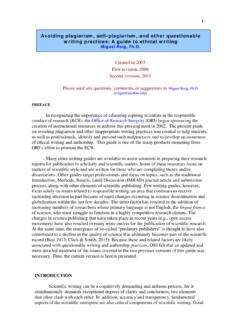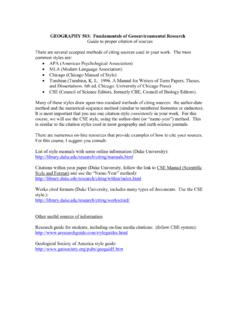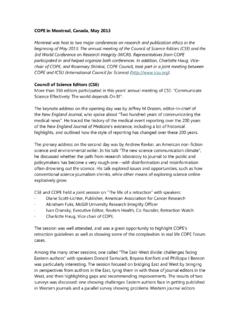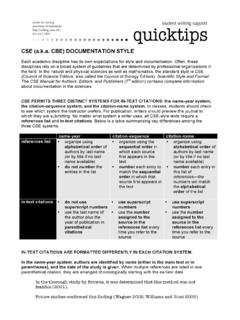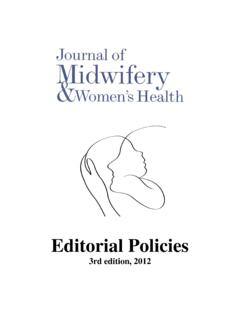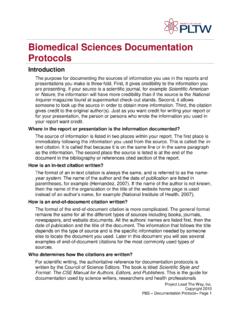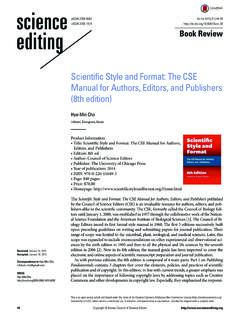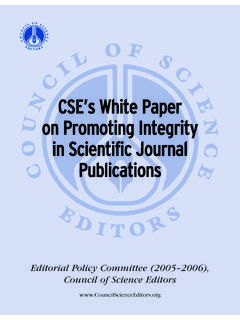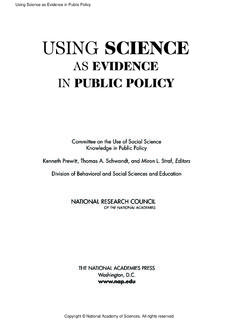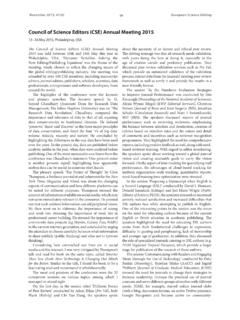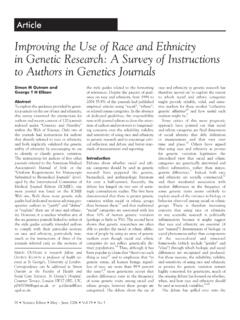Transcription of The Journal’s Role in Scientific Misconduct - ORI
1 Proceedings of the retreat on The Journal s Role in Scientific Misconduct A council of Science Editors retreat with funding from the Office of Research Integrity 7-9 November 2003 Lansdowne Resort and Conference Center Lansdowne, Virginia Retreat cochairs Jessica Ancker Traumatic Brain Injury Clinical Trials Network Dept. of Biostatistics, Columbia University Faith McLellan The Lancet Proceedings recorder and editor Jessica Ancker Contents Introduction 1 Dealing with Suspected Misconduct from the Journal editor s Perspective 1 Catherine D DeAngelis, editor , JAMA .. 1 Richard Horton, editor , The Lancet .. 2 Dealing with Suspected Misconduct from the Point of View of Academe, Oversight and Advisory Bodies, and Regulatory Agencies 3 C K (Tina) Gunsalus, Special Counsel, Office of the University Counsel, University of Illinois at 3 Alan Price, Associate Director, Office of Research 4 James T (Jim) Kroll, Head of Administrative Investigations, National Science Foundation.
2 7 Harvey Marcovitch, Syndications editor , BMJ Journals .. 8 Case-Study Discussions 8 CASE 1: Investigators seek documents from journal .. 9 CASE 2: Images have been 10 CASE 3: A dispute among authors .. 10 CASE 4: The wording of a retraction .. 11 CASE 5: An author refuses to retract .. 11 CASE 6: A reviewer suggests that a journal reanalyze an author s data .. 12 CASE 7: Investigators ask for peer reviewer s name .. 12 CASE 8: Coauthors want their names cleared .. 13 Scientific Misconduct in the Physical sciences 14 Martin Blume, editor -in-Chief, American Physical Society .. 14 Cleaning Up the Aftermath of Misconduct 15 Martin Blume, editor -in-Chief, American Physical Society .. 15 Sheldon Kotzin, Executive editor , MEDLINE, and Chief of Bibliographic Services, National Library of 15 Can Misconduct Be Prevented? 17 Mary Scheetz, Director of Extramural Research, Office of Research 17 Alan Price, Associate Director, Office of Research 17 Harvey Marcovitch, Syndications editor , BMJ Journals.
3 18 Concluding Remarks 18 Richard Horton, editor , The Lancet .. 18 Additional Resources on Scientific Misconduct and Journals 19 Policy Statements .. 19 Books and Chapters .. 19 Case Studies and Additional 19 The Journal s Role in Scientific Misconduct Introduction Scientific journals play an important role in the exposure and correction of research Misconduct . Peer reviewers may detect fraud before publication; readers, after publication. Journals also perform a vital service by publishing corrections or retractions after research Misconduct has been confirmed. Those responsibilities present ethical and practical challenges to journal editors, who may find themselves with little guidance about how to act. How should an editor decide whether to suspect Misconduct ? Should a journal s staff investigate allegations of Misconduct , or should they refer cases to the author s academic institution, employer, or funding agency? Should editors talk to each other about such allegations, or should they treat cases as confidential?
4 How should corrections, retractions, and expressions of concern be worded? What resources are available to help journal editors with these questions? To help editors address such issues, the council of Science Editors sponsored the Retreat on the Journal s Role in Scientific Misconduct on 7-9 November 2003. The Office of Research Integrity (ORI), in the US Department of Health and Human Services, supported the retreat with a $20,000 grant, and its staff provided case studies and speakers for the event. More than 70 people from around the world attended the intensive weekend event. Almost half the schedule was reserved for small- and large-group discussions so that editors could share their experiences with each other. In addition, speakers at prominent journals, funding agencies, academic institutions, and MEDLINE were invited to ensure that participants would have a chance to hear a wide array of viewpoints. Most participants were affiliated with journals or academic institutions in the United States, the United Kingdom, Canada, or Western Europe.
5 CSE also raised money to sponsor five editors from India, China, and Serbia who might not otherwise have been able to attend. The scholarships were made possible by contributions from Thomson ISI, Rockefeller University Press, Inera, Inc., Cadmus Professional Communications, and the ORI grant. Joseph Martin, dean of the Harvard Faculty of Medicine, was scheduled to deliver the keynote address on Friday. However, he canceled his appearance because of the unexpected death of a friend. Instead, the retreat was opened with talks by Catherine D (Cathy) DeAngelis, editor of JAMA, and Richard Horton, editor of The Lancet. This report summarizes the scheduled speeches and, to a lesser extent, the group discussions that took place over the weekend. Dealing with Suspected Misconduct from the Journal editor s Perspective Catherine D DeAngelis, editor , JAMA DeAngelis said that journal editors are given some privilege in their roles as gatekeepers of the Scientific literature, and in return there is an expectation that editors will be honest A council of Science Editors Retreat with support from ORI 1 The Journal s Role in Scientific Misconduct and straightforward.
6 In 1989, the US Public Health Service (PHS) published a definition of Scientific Misconduct as fabrication, falsification, plagiarism, or other serious deviations from the Scientific norm. Detection lies in the hands of editors, peer reviewers, coauthors, and readers. Examples of Misconduct by scientists include describing data that don't exist, forgery, misrepresenting or deliberately distorting data, suppressing data, stealing other people s ideas, violating copyright, omitting coauthors names, including noncontributors as authors, and misrepresenting publication status. Editors and reviewers can also commit Misconduct . Examples include delaying the peer-review process for personal gain, publicly using confidential information, and stealing ideas. At JAMA, there has been only one incident of confirmed Misconduct in a published article involving an author who lied. A student published an article about a personal experience for a column, but when the author's mentor read it, he noticed factual problems and reported them to JAMA.
7 The journal asked the mentor to write a letter to the editor about the issue and then asked the student to write a response. JAMA published both letters and reported the incident to the dean of the student's institution. In general, JAMA refers Misconduct allegations to the relevant institution for investigation and publishes corrections or retractions if needed at the end of that process. Richard Horton, editor , The Lancet Inspired by the popular movie series, Horton identified six elements that affect and are affected by research Misconduct : M(arket forces): How research fits into the marketplace. A(ccess to information). T(errorism): How published information could be used by bioterrorists. R(eview): Peer review. I(ntegrity): Scientific integrity. X: The x factor, which is public trust in the research process. He also shared a case study of research- Misconduct allegations. An article reporting a strong beneficial effect of diet in heart disease was submitted to a journal, and after generally favorable reviews, the journal asked for some revisions.
8 The authors said that some of the questions couldn t be answered, because the original data had been destroyed by termites, and they deleted portions of the article related to those questions. The revised article was published. The journal was then contacted by an editor at a second journal and by an epidemiologist reader. Both said that one of the coauthors (who was from India) had a history of questionable publications; when questions arose in connection with a previous publication, the author had also claimed that he could not supply his original data, because they had been destroyed by termites. The case had been reported to the Indian council of Medical Research, which issued a report acknowledging that there were unanswered questions but did not give a verdict of fraud. At that point, the journal editor asked the statistical coauthor (who was from A council of Science Editors Retreat with support from ORI 2 The Journal s Role in Scientific Misconduct another country) for assurances about the data and suggested a visit to India to inspect the original data.
9 Although the coauthor first denied that he had any responsibility for verifying the data, he later did visit India and said that he was satisfied with the integrity of the work. The article remains unpublished. In response to a question, Horton said that British libel law would make it difficult to publish any direct allegation about the case, even a letter from a reader that questioned the integrity of the research. However, if the article were published, a journal could publish an expression of concern about the unavailability of the original data. In discussion after Horton s talk, a representative from the Indian council of Medical Research, Kanikaram Satyanarayana, said that the council had authority only over research that it had funded, and the researcher in question had no funding. He also said that it was important to work cooperatively, rather than punitively, with researchers. Dealing with Suspected Misconduct from the Point of View of Academe, Oversight and Advisory Bodies, and Regulatory Agencies C K (Tina) Gunsalus, Special Counsel, Office of the University Counsel, University of Illinois at Urbana-Champaign Gunsalus discussed why institutions are often unable to resolve allegations of Misconduct .
10 She began with an anecdote from her career in which a faculty member had been accused of Misconduct , including embezzlement and falsification of data. In its investigation, the university committee had been influenced by the fact that the young accuser seemed emotionally unstable and not very credible, whereas the faculty member appeared confident and charismatic. Although the committee had concluded that the accusation was without merit, the faculty member was convicted years later of the same charges. Gunsalus pointed out that the university investigation committee, although well-intentioned, had never reviewed the raw data, in large part because it had been strongly influenced by the reputation and personalities of the two parties. The anecdote illustrates that universities and research institutions do have a commitment to integrity, but there are reasons why this commitment does not always translate to good solutions. Barriers The burden of complying with the explosion of federal and other regulations.



